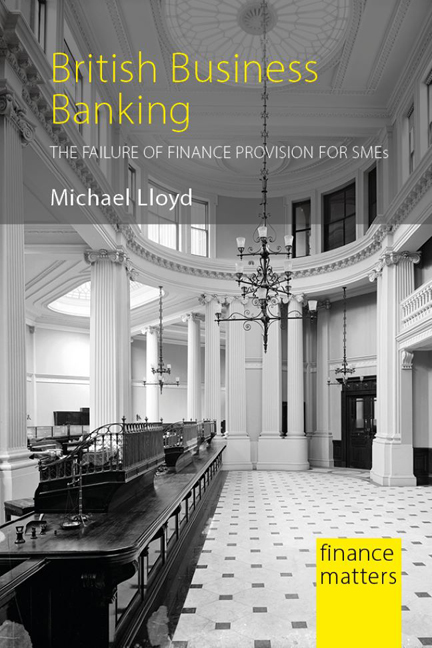Book contents
- Frontmatter
- Contents
- Acknowledgements
- Introduction
- 1 British banks and the industrial revolution
- 2 Modern British banking since 1900
- 3 From the other side: the culture of British SMEs
- 4 Banking problems for SMEs and alternative financial provision
- 5 UK financial and political economic culture
- 6 Optimum financial institutional structures and SME performance
- 7 Implementing reform
- Notes
- References
- Index
1 - British banks and the industrial revolution
Published online by Cambridge University Press: 20 December 2023
- Frontmatter
- Contents
- Acknowledgements
- Introduction
- 1 British banks and the industrial revolution
- 2 Modern British banking since 1900
- 3 From the other side: the culture of British SMEs
- 4 Banking problems for SMEs and alternative financial provision
- 5 UK financial and political economic culture
- 6 Optimum financial institutional structures and SME performance
- 7 Implementing reform
- Notes
- References
- Index
Summary
This chapter begins by indicating that in the UK the early industrial revolution was principally driven by entrepreneurs whose desire was for short-term risk capital to test their new technology, affecting industrial processes as well as products. Their need was for working capital, or as it was also known “circulating capital”. The entrepreneurs’ requirement appeared to be better served by relying on their own capital or on merchant capital rather than attempting to persuade existing banks to provide finance. Indeed, in some cases entrepreneurs founded their own banks, specializing in specific industries. The involvement of Quakers, both as entrepreneurs and as bankers, was notable – today's Barclays and Lloyds banks both originated in nineteenth-century Quaker families.
An analysis is presented of the comparable situations in Germany, France, and the United States. It will be shown that these industrial revolutions post-dated that of the UK, indicating the need for the banks in these countries – dealing with the more developed industrialization phase of the revolutions – to provide long-term capital to install and implement already tested technologies. This situation enabled a different structure of industrial banking to develop, with a willingness to adopt a risk profile suited to achieving long-term investment returns. The US developed initially by following the UK entrepreneurial funding model in the early 1800s, but its subsequent, if delayed, industrialization phase developed in a different manner, in relation to its banking system and structure. There is a need, therefore, to explore the reasons why, in the second industrialization phase in the UK, from 1830 to 1900, British banks did not participate in the same fashion as in say, Germany, or by following the alternative path taken in the US.
One significant factor that will be discussed, in these other European countries, is the existence of agricultural credit banks serving initially the farming communities and subsequently agricultural equipment manufacturers and merchants. In the US, the story was similar, and its wider geography led to a large variety of “unit” banks, initially serving the agricultural sector, although here there was a considerable turnover of these independent banks.
- Type
- Chapter
- Information
- British Business BankingThe Failure of Finance Provision for SMEs, pp. 7 - 32Publisher: Agenda PublishingPrint publication year: 2021

